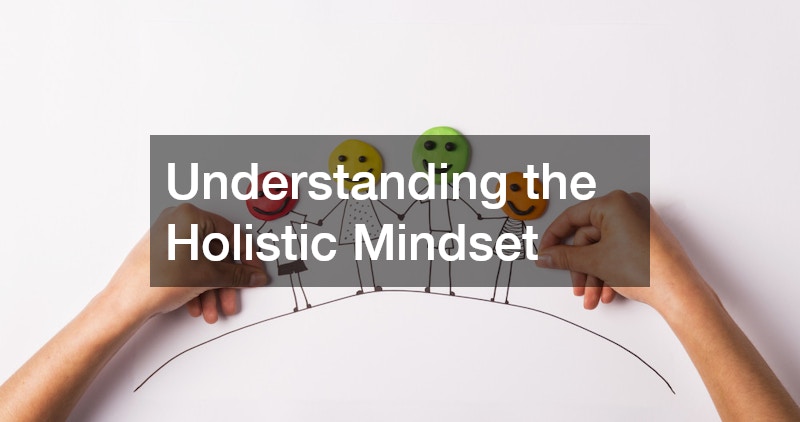In today’s fast-paced world, nurturing a holistic mindset within your family has never been more important. Our lives are often filled with stressors, distractions, and uncertainties, making it vital to carve out time for self-care. This blog delves into family self-care ideas that can help cultivate a holistic approach, ensuring physical, emotional, and spiritual well-being for every member of your household.
By prioritizing self-care, families can foster stronger relationships, improve communication, and develop a sense of community, both within the family unit and outside it. The integration of self-care practices encourages mindfulness, resilience, and the ability to navigate life’s challenges collectively. So, let’s explore a variety of engaging strategies that can promote a holistic frame of mind and improve overall family wellness.
From simple daily rituals to intentional lifestyle changes, self-care can take many forms, each contributing to a more balanced and fulfilling family life. Whether it’s through shared meals, mindful movement, creative expression, or quiet moments of reflection, embracing these practices can nurture a deeper connection between family members. By making self-care a priority, families can create a supportive environment where everyone feels valued, heard, and empowered to grow together.

Understanding the Holistic Mindset
The term “holistic mindset” refers to an approach that considers the whole person rather than just individual parts. It emphasizes the interconnection of mind, body, and spirit, encouraging families to adopt practices that nurture each facet of their health. Developing a holistic frame of mind allows family members to better understand their needs and support one another in fulfilling them.
To cultivate a holistic mindset, families should engage in regular self-reflection and communication to identify individual and collective wellness goals. Having open discussions about feelings, health concerns, and life challenges creates a safe environment for expressing needs and desires. This collaborative approach helps families to unite toward common goals, fostering deeper connections and empathy.
A holistic frame of mind also emphasizes the importance of integrating various self-care practices into daily routines. By focusing not only on physical health but also on emotional and spiritual well-being, families can create a well-rounded approach to self-care. As a result, family members will be better equipped to navigate life together, fostering resilience and a sense of belonging.
Moreover, embracing a holistic mindset means recognizing the value of balance and flexibility in daily life. Rather than striving for perfection, families should focus on progress and adaptability, allowing room for personal growth and evolving needs. Whether through mindful activities, nourishing meals, or moments of gratitude, small, consistent efforts can lead to lasting positive changes. By weaving these holistic principles into everyday life, families can create a nurturing and harmonious environment where every member feels supported and empowered.
Creating a Welcoming Environment
One key aspect of supporting a holistic frame of mind is creating a welcoming environment within the home. This can involve simple changes, such as decluttering and decorating spaces that promote calmness and positivity. When family members feel comfortable and supported in their environment, they are more likely to engage in self-care activities that benefit their overall well-being.
In addition to enhancing the physical space, fostering a welcoming atmosphere involves emotional and social elements. Establishing regular family gatherings can strengthen bonds, as these occasions promote open communication and a sense of belonging. Joining a welcoming church community can also provide families with additional support systems, reinforcing a holistic mindset through shared values and beliefs.
Creating an inviting environment goes beyond the home; it includes engaging with the broader community. Participating in local events, volunteering, or simply being active in the neighborhood helps families feel connected. This sense of community not only enhances individual well-being but also reinforces the family unit, promoting a holistic frame of mind for all members.

Physical Health Through Self-Care
Promoting physical health is a crucial component of a holistic mindset. To accomplish this, families should prioritize regular exercise and activities that they enjoy together. Whether it’s a family hike, bike ride, or a playful dance session in the living room, movement is essential for keeping both the body and mind healthy.
For families with specific health needs, exploring therapeutic options such as iv therapy can provide significant benefits. This form of treatment delivers nutrients directly into the bloodstream, allowing for quick replenishment and better hydration. Such therapies can be particularly useful for those feeling run down or lacking energy, supporting a family’s overall vitality.
Incorporating unique activities like an aquatic therapy session can also enhance physical and emotional well-being. These sessions can benefit individuals suffering from physical ailments, providing low-impact exercise while promoting relaxation. If you find that this type of exercise is something you truly enjoy, consider talking with a pool installer about having a pool put in for you to use daily. By involving the entire family, aquatic therapy can encourage teamwork and bonding while focusing on holistic health.
Another key aspect of physical self-care is maintaining a balanced and nourishing diet. Prioritizing whole, nutrient-rich foods can provide sustained energy, support immune function, and enhance overall well-being. Families can make healthy eating more enjoyable by preparing meals together, trying new recipes, or even starting a small home garden. By making conscious food choices and staying hydrated, families can reinforce the connection between nutrition and vitality, laying the foundation for a strong and resilient lifestyle.
Emotional and Mental Wellness
In addition to physical health, emotional and mental wellness is paramount to creating a holistic frame of mind. Family members can start by investing time in mindfulness practices, such as meditation or guided imagery. These techniques help to reduce stress and improve overall emotional health, enabling families to approach challenges with a calm and focused mindset.
Encouraging children to express their feelings and thoughts is vital for developing emotional intelligence. Family discussions, art projects, or journaling can serve as effective outlets for self-expression. By allowing children to share their thoughts and feelings, families create a safe space for communication, strengthening their relationships and supporting a holistic mindset.
Additionally, seeking professional help when needed is essential for mental health. Engaging with family doctors or therapists can provide support during challenging times. Recognizing when to seek help empowers families to prioritize their emotional well-being and fosters a proactive approach to holistically caring for each other.

Nurturing Spiritual Well-Being
Spiritual well-being is another pillar of a holistic frame of mind that families should focus on nurturing together. This aspect encompasses personal beliefs, values, and connections to a higher purpose. Participating in activities that resonate with each family member—be it through nature, learning, or spirituality—can help fortify this dimension of self-care.
Engaging with a welcoming church community can provide spiritual support and connection for families seeking a deeper understanding of their beliefs and values. Through group worship, discussions, and community service, families can bond with others who share similar spiritual journeys, reinforcing their commitment to a holistic mindset. Such involvement fosters a sense of belonging and encourages growth, making it an essential aspect of family self-care.
Additionally, practices such as gratitude exercises or meditation can further enhance spiritual well-being. Creating a family ritual centered around expressing gratitude can help each member appreciate their blessings and nurture a holistic frame of mind. These shared practices can unify the family, creating a sense of purpose and direction as they navigate their individual paths.
Exploring nature together is another powerful way to nurture spiritual well-being. Spending time outdoors—whether through hiking, camping, or simply watching a sunset—can provide a sense of peace, wonder, and connection to something greater than oneself. Nature has a unique way of grounding individuals, offering moments of reflection and clarity. By embracing these experiences as a family, you can cultivate mindfulness, strengthen emotional bonds, and deepen your collective sense of purpose.
Integrating Body and Mind Practices
To foster a holistic mindset, families can explore integrative practices such as chiropractic care and red light therapy. Chiropractic care can help alleviate physical discomfort and promote overall mobility through regular alignment and adjustments. Investing in this type of care supports not only physical health but also emotional wellness by addressing body-related stressors.
Red light therapy is another innovative approach that families can incorporate into their routines. This form of therapy uses low-level wavelengths of light to promote healing and reduce inflammation, positively impacting overall health. By experimenting with these modalities, families can discover what resonates with them while creating opportunities for collective self-care practices.
As families explore various body and mind practices, they empower each other to prioritize their health and well-being. Regular family check-ups with family doctors and discussions about health trends or treatments can enhance knowledge, allowing families to make informed decisions together. This integration of knowledge, practices, and support helps strengthen the already vital connection within the family, promoting a holistic frame of mind.

Professional Support in Self-Care
While family support is crucial for encouraging well-being, seeking professional help can enhance self-care efforts. Engaging with professionals such as nutritionists, personal trainers, or therapists can guide families to pursue healthy habits effectively. Professional personal training can provide tailored exercise regimens for each family member, enhancing strength and well-being.
Consulting local medical spas can offer families access to various wellness services, from aesthetic treatments to relaxation therapies, ensuring holistic self-care. Such institutions often provide specialized care that caters to individual needs, allowing family members to experience wellness in diverse ways. By sharing these experiences, families can bond and collectively appreciate their journey toward health.
Coordination of care among various professionals—like family doctors, physical therapists, and nutritionists—can create comprehensive plans tailored to each member’s needs. By involving a range of experts, families can enhance their support systems, improving their collective well-being. This multifaceted approach not only promotes an environment more conducive to holistic health but also strengthens family connections.
Additionally, mental health professionals play a vital role in family self-care by providing guidance on stress management, emotional resilience, and communication strategies. Therapists or counselors can help families navigate challenges, strengthen relationships, and develop coping mechanisms for life’s uncertainties. Whether through individual sessions or family therapy, seeking professional mental health support fosters emotional well-being and ensures that each family member feels heard, understood, and valued.
Healthy Routines and Habits
Establishing healthy routines is fundamental for families looking to promote a holistic frame of mind. Creating consistent schedules for meals, exercise, family time, and sleep helps each member develop habits that contribute to overall well-being. Routines enable families to align their efforts toward shared goals, making it easier to reinforce healthy behaviors collectively.
For example, incorporating kids dental care as part of the family routine can teach children the importance of maintaining overall health from a young age. Scheduling regular dental visits and emphasizing dental hygiene can help foster a sense of responsibility and self-care. As children learn these habits alongside their parents, they develop a holistic approach to health that will benefit them throughout their lives.
Incorporating outdoor activities and nature into family routines engages everyone in physical and mental well-being. Designating outdoor adventure days or simply enjoying nature walks encourages exercise while fostering connection with the environment. This shared time in nature supports a holistic frame of mind, reinforcing the importance of balance and well-being in every aspect of family life.
Fostering Connection Through Quality Time
Quality time spent together is an invaluable aspect of nurturing a holistic mindset within the family. By prioritizing time for meaningful interactions, families strengthen their bonds and create lasting memories. Engaging in activities such as game nights, cooking together, or simply sharing a meal enriches relationships and offers opportunities for open communication.
As families engage in shared experiences, they learn to appreciate each other’s perspectives and differences, ultimately promoting understanding and acceptance. This quality time is essential for building empathy and insight, vital components for cultivating a holistic frame of mind. Through these efforts, families can create deeper connections that support mental, emotional, and spiritual well-being.
Finding balance between everyday responsibilities and dedicated family time can be challenging. Nevertheless, by intentionally scheduling time for connection, families can cultivate an environment where everyone feels valued and heard. This level of care inherently promotes a holistic mindset, allowing love, care, and understanding to flourish within the family unit.
Incorporating technology-free moments into family time can also strengthen relationships and encourage more meaningful interactions. Setting aside distractions like phones, tablets, and televisions allows family members to be fully present with one another. Whether through outdoor adventures, storytelling, or simply enjoying a quiet evening together, unplugged moments create space for genuine connection, laughter, and heartfelt conversations—nurturing a sense of togetherness that is essential for a holistic family mindset.
Creating a holistic frame of mind for your family takes intention, effort, and commitment, but the rewards are immeasurable. By integrating physical wellness, emotional support, spiritual growth, and nurturing familial connections, families can foster a culture of self-care that promotes overall well-being. As you explore various strategies like therapeutic activities, healthy routines, and quality time, remember that the most critical aspect is embracing the journey together.
Whether through local community engagement, thrilling physical activities, or fostering meaningful conversations, each step toward a holistic mindset strengthens the family unit. Building a foundation of support, understanding, and nurturing can empower family members to thrive individually and collectively. Ultimately, the essence of a holistic frame of mind shines through the love and connection shared among family members, contributing to resilience and emotional fulfillment.
As you strive for a holistic frame of mind, don’t forget to reach out to professionals who can guide and support you. Tap into resources like family doctors, local medical spas, and personal trainers to enrich your journey of self-care. With diligence and shared purpose, families can flourish in mind, body, and spirit, creating a legacy of wellness for future generations.
Above all, remember that self-care is not a destination but an ongoing practice that evolves with your family’s needs and experiences. Be patient with the process, celebrate small victories, and remain open to adapting your approach over time. By fostering an environment of compassion, balance, and intentional well-being, you lay the groundwork for a family culture rooted in health, happiness, and lasting connection.



